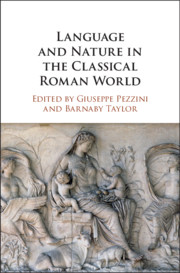Book contents
- Language and Nature in the Classical Roman World
- Language and Nature in the Classical Roman World
- Copyright page
- Contents
- Contributors
- Acknowledgements
- Abbreviations
- Introduction: First Thoughts on Language and Nature
- Chapter 1 Posidonius’ Linguistic Naturalism and Its Philosophical Pedigree
- Chapter 2 Lucilius on Latin Spelling, Grammar, and Usage
- Chapter 3 Nigidius Figulus’ Naturalism
- Chapter 4 Naturalism in Morphology
- Chapter 5 What’s Hecuba to Him?
- Chapter 6 Linguistic Naturalism in Cicero’s Academica
- Chapter 7 Linguistic Naturalism and Natural Style
- Chapter 8 Natural Law and Natural Language in the First Century BCE
- Bibliography
- Index Locorum
- Index Nominum et Rerum
Chapter 5 - What’s Hecuba to Him?
Varro on the Natural Kinship of Things and of Words
Published online by Cambridge University Press: 05 June 2019
- Language and Nature in the Classical Roman World
- Language and Nature in the Classical Roman World
- Copyright page
- Contents
- Contributors
- Acknowledgements
- Abbreviations
- Introduction: First Thoughts on Language and Nature
- Chapter 1 Posidonius’ Linguistic Naturalism and Its Philosophical Pedigree
- Chapter 2 Lucilius on Latin Spelling, Grammar, and Usage
- Chapter 3 Nigidius Figulus’ Naturalism
- Chapter 4 Naturalism in Morphology
- Chapter 5 What’s Hecuba to Him?
- Chapter 6 Linguistic Naturalism in Cicero’s Academica
- Chapter 7 Linguistic Naturalism and Natural Style
- Chapter 8 Natural Law and Natural Language in the First Century BCE
- Bibliography
- Index Locorum
- Index Nominum et Rerum
Summary
‘What’s Hecuba to him, or he to Hecuba, that he should weep for her?’ (Hamlet 2.2, 536–7), asks Hamlet, watching a player’s tear-filled recital of Hecuba’s sufferings. Priam and Hecuba make a briefer appearance in Varro’s De lingua Latina: while we immediately grasp that lego and legi both express the same action, each at a different time, were one of them expressed as ‘Priamus’ and the other as ‘Hecuba’, they would not additionally signify their unity (8.3). Hence the necessity of inflexion in speech: we could never remember enough words, if they were all different and ‘unrelated’.
- Type
- Chapter
- Information
- Language and Nature in the Classical Roman World , pp. 121 - 152Publisher: Cambridge University PressPrint publication year: 2019
- 1
- Cited by

